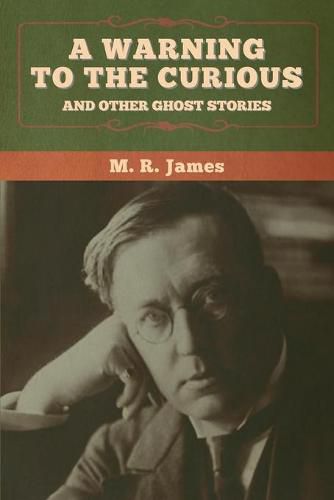Readings Newsletter
Become a Readings Member to make your shopping experience even easier.
Sign in or sign up for free!
You’re not far away from qualifying for FREE standard shipping within Australia
You’ve qualified for FREE standard shipping within Australia
The cart is loading…






This title is printed to order. This book may have been self-published. If so, we cannot guarantee the quality of the content. In the main most books will have gone through the editing process however some may not. We therefore suggest that you be aware of this before ordering this book. If in doubt check either the author or publisher’s details as we are unable to accept any returns unless they are faulty. Please contact us if you have any questions.
Montague Rhodes James, OM, MA, (1 August 1862 - 12 June 1936), who used the publication name M. R. James, was an English mediaeval scholar and provost of King’s College, Cambridge (1905-1918) and of Eton College (1918-1936). He is best remembered for his ghost stories, which are regarded as among the best in the genre. James redefined the ghost story for the new century by abandoning many of the formal Gothic cliches of his predecessors and using more realistic contemporary settings. However, James’s protagonists and plots tend to reflect his own antiquarian interests. Accordingly, he is known as the originator of the antiquarian ghost story .
James held strongly traditional views about literature. In addition to ghost stories, he also enjoyed reading the work of William Shakespeare and the detective stories of Agatha Christie. By contrast, James disliked most contemporary literature, strongly criticizing the work of Aldous Huxley, Lytton Strachey and James Joyce (whom James called a charlatan and that prostitutor of life and language ). James also supported the banning of Radclyffe Hall’s 1928 novel about lesbianism, The Well of Loneliness, stating, I believe Miss Hall’s book is about birth control or some kindred subject, isn’t it. I find it difficult to believe either that it is a good novel or that its suppression causes any loss to literature .
As a student at King’s, James had opposed the appointment of Thomas Henry Huxley as Provost of Eton because of Huxley’s agnosticism. In his later life, James had little interest in politics and rarely spoke on political issues. However, James often spoke out against the Irish Home Rule movement, and in his letters he also expressed a dislike for Communism. James’s friend A. C. Benson considered him to be reactionary and against modernity and progress . (wikipedia.org)
$9.00 standard shipping within Australia
FREE standard shipping within Australia for orders over $100.00
Express & International shipping calculated at checkout
This title is printed to order. This book may have been self-published. If so, we cannot guarantee the quality of the content. In the main most books will have gone through the editing process however some may not. We therefore suggest that you be aware of this before ordering this book. If in doubt check either the author or publisher’s details as we are unable to accept any returns unless they are faulty. Please contact us if you have any questions.
Montague Rhodes James, OM, MA, (1 August 1862 - 12 June 1936), who used the publication name M. R. James, was an English mediaeval scholar and provost of King’s College, Cambridge (1905-1918) and of Eton College (1918-1936). He is best remembered for his ghost stories, which are regarded as among the best in the genre. James redefined the ghost story for the new century by abandoning many of the formal Gothic cliches of his predecessors and using more realistic contemporary settings. However, James’s protagonists and plots tend to reflect his own antiquarian interests. Accordingly, he is known as the originator of the antiquarian ghost story .
James held strongly traditional views about literature. In addition to ghost stories, he also enjoyed reading the work of William Shakespeare and the detective stories of Agatha Christie. By contrast, James disliked most contemporary literature, strongly criticizing the work of Aldous Huxley, Lytton Strachey and James Joyce (whom James called a charlatan and that prostitutor of life and language ). James also supported the banning of Radclyffe Hall’s 1928 novel about lesbianism, The Well of Loneliness, stating, I believe Miss Hall’s book is about birth control or some kindred subject, isn’t it. I find it difficult to believe either that it is a good novel or that its suppression causes any loss to literature .
As a student at King’s, James had opposed the appointment of Thomas Henry Huxley as Provost of Eton because of Huxley’s agnosticism. In his later life, James had little interest in politics and rarely spoke on political issues. However, James often spoke out against the Irish Home Rule movement, and in his letters he also expressed a dislike for Communism. James’s friend A. C. Benson considered him to be reactionary and against modernity and progress . (wikipedia.org)